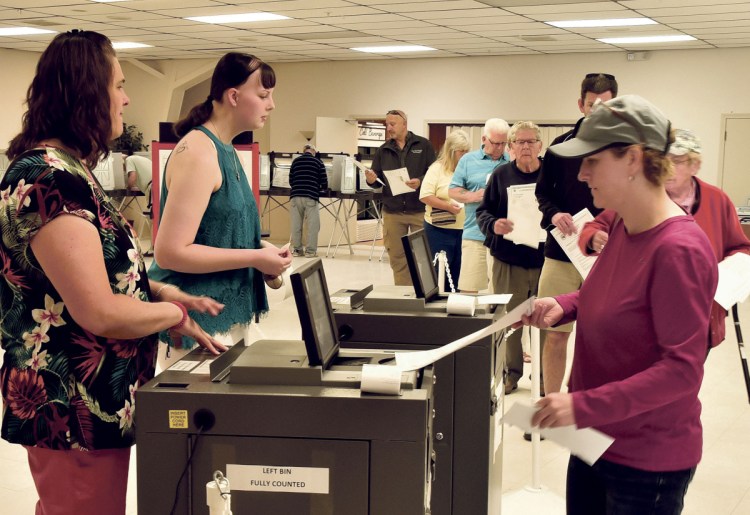WINSLOW — Residents Tuesday narrowly approved an $8.1 million bond to finance a school renovation project that has divided the town over the last several months.
The 881-825 vote — with 194 ballots left blank — to move forward came after a long, contentious approval process in which members of the Town Council and School Board have often been at odds.
“It’s been quite a path getting to this point,” said Joel Selwood, chair of the Winslow School Board, at the Winslow VFW after the votes were tallied. “I’m pleased that the voters of Winslow passed this bond, and we can proceed with the final project.”
Now that the bond has passed, Winslow Junior High School will be closed. The bond will fund the renovation of both the high school and the elementary school to absorb displaced sixth-, seventh- and eighth-grade students. In addition to classroom space, the bond includes money for a new 415-seat auditorium and for auxiliary gymnasium and food service expansions at the high school.
Selwood said a lot of work and planning still has to be done before the project gets underway.
According to a timeline from architect Stephen Blatt, construction will begin in June 2019 and be completed by September 2020.
Voters also approved a $15,577,401 education budget for 2018-19 by a vote of 1,140-719 with 41 blank votes. According to a tax impact document from Town Councilor Ken Fletcher, the property tax rate will increase by $0.94 per $1,000 in property valuation, which could increase taxes by $137 per year for the median property valued at $146,000.
Phil St. Onge, a resident who has been a vocal opponent of the bond and its process, said he was concerned by the 194 ballots that were left blank on the bond question.
The town printed the bond question on one side of the ballot and the budget questions on the other. St. Onge said voters did not flip over the ballot to see the bond question on the other side. He questioned why the town would not print the two questions on either two sets of paper or on the same side of one piece of paper.
“You could make the case that because of the way they did it some people were disenfranchised today,” he said.
St. Onge said he didn’t think all 194 people who didn’t fill out that portion of the ballot would have rejected the bond, but regardless, he said, there’s no way 194 people went to the polls and decided not to vote on that issue.
“It’s frustrating,” he said.
He said he was proud that he and others were successful in their opposition campaign last November when voters rejected a $10.3 million school renovation that would have included a larger auditorium.
“We saved taxpayers $2.1 million from the first bond plus interest,” he said.
According to Fletcher, the average yearly debt service payment for the bond will be at least $532,575, or an average property tax rate effect of $0.83 per $1,000 of property value, which could increase taxes by an average of $121 per year for the median homeowner with a home valued at $140,000.
School officials have disagreed with that calculation, saying Fletcher did not include the $423,000 of estimated cost avoidance from closing the junior high and retired debt that could be used toward the bond payment.
Incoming Superintendent Peter Thiboutot has said the bond would result in a property tax rate increase of $0.819 for every $1,000 of assessed property value, raising taxes by an average of $118.75 per year for the median household.
Voters at the polls Tuesday morning were fairly split on whether to approve the bond.
Those in favor of the project mostly cited the need for upgraded facilities and moving students out of the junior high, which was built in 1928 and has become hazardous and inefficient.
“I think an upgrade in facilities are needed and the junior high needs to be phased out,” said resident Linda McCann. McCann, 61, said students need to be moved out of the building and subsequently need someplace new to inhabit.
Karen Loftus and Samantha Cote also voiced concern about the state of the junior high. Loftus said the students needed to leave the building that’s “falling down around them.”
Cote, 32, also said she thought it is ridiculous that those who are opposed to the bond are making it all about the auditorium — which was a major point of contention in the $10.3 million bond that voters rejected — when it should be about the kids.
Others who voted “yes” said they were doing it for the students in the school system, part of which means making sure there is an adequate performing arts space for students who are interested in drama and music.
Kim Leadbetter, 48, said she has a daughter in Winslow who is interested in both athletics and the arts, and she doesn’t believe the two sets of programs are treated equally.
“I feel that the drama department has been slighted,” Leadbetter said.
At least one resident, Jackie Kulik, 58, voted against the bond because of her belief that the auditorium was not big enough.
Others who voted “no,” however, said the project would be too much of a burden on taxpayers.
Joe, who did not want to give his last name, said a bond would have to cost substantially less for him to consider voting to approve it.
“I paid my way, they can pay their (way),” he said.
Lee Vanadestine, 45, said he does not have any children enrolled in the public school system, but it still accounts for 50 percent of his taxes.
“School spending is out of control,” he said, adding that he sent his kids to private school. He said the school system needs to get a handle on its spending.
Emily Higginbotham — 861-9239
ehigginbotham@centralmaine.com
Send questions/comments to the editors.



